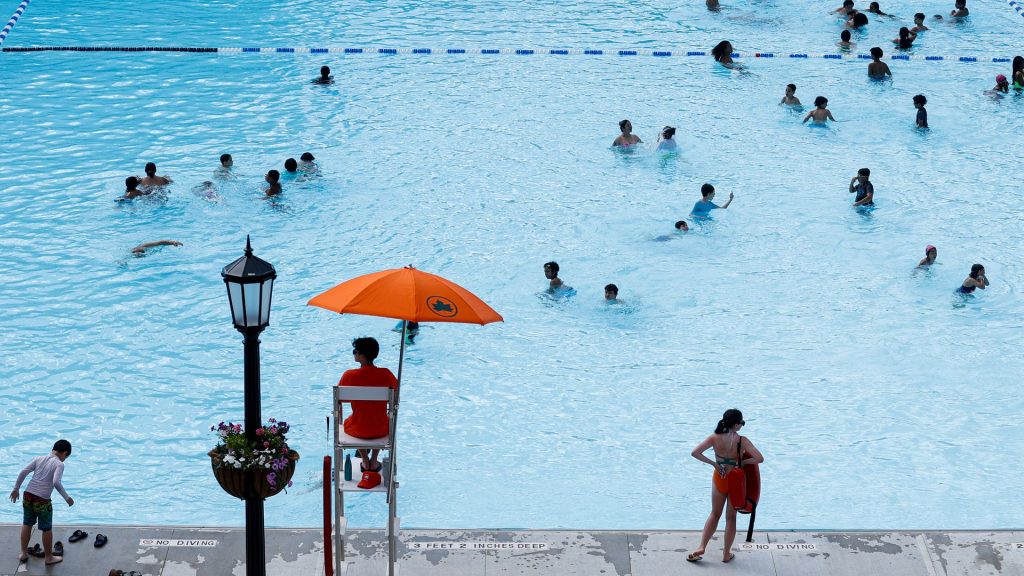How Houston solved its lifeguard shortage. And how other cities can, too

For years, the city of Houston has struggled to open its public pools. Pinched by a COVID-19 pandemic-born lifeguard shortage that hampered the ability of cities across the country to fully staff pool decks, Houston’s once-lively cache of three dozen outdoor pools fell largely silent.
As a result, thousands of families lacked access to a safe place to swim in a sweltering city that logged 45 days with temperatures above 100 degrees in 2023.
But things are looking up. A new city policy lowering the minimum age for lifeguards to 15 has enabled Houston to hire staff at a rate “31% ahead of where we were last year,” said Houston’s deputy director of recreation, Prentiss Collins.
“We are so far ahead of schedule,” Collins told Straight Arrow News.
By lowering the minimum age from 16 to 15, Collins believes he will be able to open 36 of the city’s 38 pools in the coming weeks. Two will remain closed for an extended period due to maintenance issues.
Already, Houston’s parks department has opened 26 of its pools on a full, six-days-a-week schedule. That’s a significant increase in available swim time compared to 2024, when the city opened 29 pools, each open for three days a week. And 15-year-olds are making up a large portion of the workforce allowing this to happen; 1 in 4 of Houston’s lifeguards are 15-year-olds this summer, according to a Straight Arrow News analysis of the city’s personnel figures.
“It gives us a lot of flexibility to have an extra body when we need it,” Collins said.
What are the rules about 15-year-old lifeguards?
Houston isn’t the first city to employ this strategy, but it is the biggest. The three U.S. cities with larger populations than Houston – New York City, Los Angeles and Chicago – all require lifeguard candidates to be at least 16 years old.
Yet the American Red Cross, which certifies about 2 million lifeguards each year, has long permitted lifeguards to earn their whistles at the age of 15.
“The American Red Cross has always certified lifeguards at the age of 15,” said Bernard J. Fisher II, director of health and safety at the American Lifeguard Association. “It’s an exit requirement. You can start the course at any time, but you must be 15 by the time you’re certified to be a lifeguard.”
Many cities simply assume lifeguards must be 16, according to Fisher. In Houston, city officials only learned in 2023 that hiring 15-year-olds is something the city is legally able to do.

Nationally, about 25% of the lifeguard workforce is composed of 15-year-olds, Fisher said, adding that “the Red Cross has been training and certifying hundreds of thousands of 15-year-olds for decades.” Historically, these younger lifeguards have had to find jobs at private pools and clubs. However, this is changing as more cities look toward hiring these younger lifeguards.
While 15-year-olds are certified using the same standards as older lifeguards, there are some job responsibilities for which they are not cleared to take on.
“They can’t work in the deep well, and they can’t work up top,” Collins noted. “They have to work on the pool deck.”
But this alone enables Houston to stretch its staff as long as there are enough supervising guards available.
Cities like Austin, Texas, have employed 15-year-old lifeguards for years, shielding Austin from the effects of the lifeguard shortage. While Houston struggled to reopen its pools post-pandemic, Austin did not. And as Houston’s lifeguard shortage led to unequal swimming access for residents, with public pools opening in whiter, more affluent neighborhoods, while remaining shuttered in poorer, more diverse neighborhoods, Austin reported no such issues.
How are other cities recruiting and retaining lifeguards?
Across the country, cities are rewiring the ways they once recruited lifeguards. And it’s working.
During the pandemic, 100,000 public pools were forced to close or significantly reduce hours due to a dearth of lifeguards. That figure accounted for about one-third of the nation’s public pools, according to the American Lifeguard Association. Those pool closures meant communities didn’t have access to cooling activities during hot summers, and many kids who could one day enter the lifeguard pipeline themselves didn’t have a space to learn to swim.
Now, “all the anecdotal evidence and discussions show that we are past the [lifeguard] shortage nationally,” said William D. Ramos, a member of the American Red Cross Scientific Advisory Council and an associate professor at Indiana University School of Public Health.
With one hurdle overcome, he said it’s time to zero in on retention.
“If a facility is still experiencing a shortage, they could examine their recruitment strategies to see how they are working to keep an ongoing flow of certified lifeguards,” Ramos told Straight Arrow News.
In Milwaukee, Wisconsin, the county parks hit a low point in 2021, when the department was able to hire only 53 lifeguards to staff its eight outdoor and two indoor pools, forcing the county to keep many pools shuttered for the season. But a pivot in priorities has helped the system staff up.
“This year, we have 155 lifeguards, where last year we ended our year with 130,” said Andrea Wallace, assistant director of recreation and business services at Milwaukee County Parks. “We shifted our focus quite a bit to really focus on retention. Because while we can get first-year guards, we’re having a hard time holding onto guards for that three-, four- and five-year mark, so we have senior guards to operate our pools.”
To make second summers more tempting, Wallace and her team surveyed their lifeguards to ask what kind of incentives could help entice staff to return year after year. Wallace was surprised by the answers.
“We thought it was going to be bonuses and things like that,” she said.
However, the younger generation instead suggested perks like baseball tickets, name-brand merchandise and energy drinks. So Wallace partnered with community organizations to make it happen, including a sizable ticket donation from the Milwaukee Brewers.
Houston has been offering monetary incentives for the past couple of years: a $250 sign-on bonus and another $250 for lifeguards who work through the entire summer. That’s important, Collins said. But more important, he argued, is creating a culture that kids want to return to year after year. He is optimistic that Houston is building a larger lifeguard corps, which will enable the city to open all its pools.
“That’s the target,” he said. “When we can open up more pools, we want to open up more pools. So I am confident that this year, equity will be across the table.”





